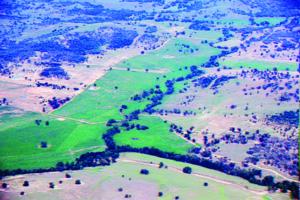"Our Defining Moment" on Climate Change: Pay Attention to Soil Health
Published 06-16-08
Submitted by Holistic Management International

ALBUQUERQUE, NM -- (MARKET WIRE) -- 06/16/08 -- "Two prominent scientists are sounding the alarm that we are in a 'defining moment'
to reduce carbon dioxide emissions into the atmosphere to combat global warming, and I couldn't agree with them more," says Peter Holter, executive director of the Albuquerque, New Mexico-based environmental non-profit, Holistic Management International (HMI), which works with stewards of large land holdings on four continents to restore land to health, productivity and profitability.
"In order to reduce CO2 emissions, it's critical that we pay very close attention to soil health," he added.
Holter was responding to recent statements by NASA climate scientist Jim Hansen and several colleagues in Science magazine, and by Indian scientist and economist Rajendra Pachauri, about the need for immediate action to combat climate change.
Hansen and his colleagues wrote, "...if humanity wishes to preserve a planet similar to the one on which civilization developed and to which life on Earth is adapted, CO2 must be reduced from its present
385 ppm (parts per million) to, at most, 350 ppm."
And Pachauri has pointed out that "If there's no action before 2012, that's too late. What we do in the next two to three years will determine our future. This is the defining moment."
"It's certainly a 'defining moment' for people in sub-Saharan Africa, where soil loss and desertification have led to widespread hunger and malnutrition; and the population can no longer be sustained," Holter says. "And it's certainly a defining moment for New Mexico's Rio Puerco, which in the 1880s had grass as high as a horse's belly.
Today, it's desert. And there are numerous other examples that could be cited."
According to Holter, Holistic Management practitioners working on over 30 million acres worldwide "have given a lot of thought to desertification, global warming and climate change -- and we've realized that it's critical to get people to understand -- especially if they live in urban or suburban areas -- that it is our soils -- the dirt -- that provide everything it takes for us to survive.
"Without healthy soil, we can't grow our food, nourish our livestock, conserve water and resist the effects of drought, erosion and climate change."
Holter suggests that if we want to combat global warming by reducing carbon dioxide emissions, "then we need to make some important changes in how we manage land. We begin by restoring healthy topsoil -- with methods like no-till farming and organic farming. But then, we have to go deeper."
Holter explains that "going deeper" means instituting measures that will help improve biodiversity, reverse desertification, and sequester carbon. "The folks we work with utilize an approach with animals called 'planned grazing,' which works today -- as it did for thousands of years with wild animals whose predators kept them on the move.
"As the animals moved, their hooves worked the soil, which allowed for quick absorption of their urine and dung. The soil became and remained fertilized, and the land was healthy."
Over the past 24 years, Holter says, HMI's approach has been to "plan the grazing, move the animals, and monitor them as well as the land -- and the results have been very powerful. We have measured solid improvements in land health by the successful introduction of new seedlings, the extent of plant and biodiversity in the deep soil, water infiltration in the soil, and decreasing soil erosion.
"The bottom line is, if livestock owners, public land agencies and the public can all work together to change how we manage the relationship between domestic grazing animals and the land, we will have a real opportunity to improve land health, reduce carbon emissions substantially, and help achieve NASA scientist Jim Hansen's goal of reducing CO2 in the atmosphere from 385 parts per million to 350."
Holistic Management International
Holistic Management International
More from Holistic Management International

